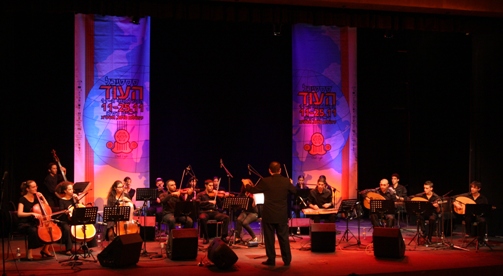
The performance of the Arab-Jewish Youth Orchestra on November 15, 2010, as part of the 11th International Oud Festival – “Journey Between Eastern and Western Traditions” – was well, named, for it was a journey to a place for which there are no maps, where traditions and people meet and music emerges.
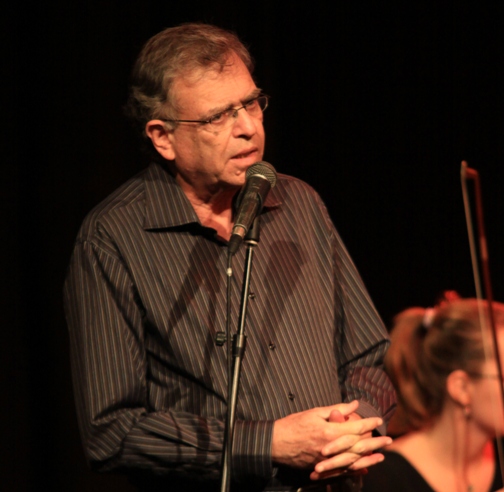
Founded in 2002, the orchestra is composed of young musicians from all parts of the country, and includes an Oud section, Qanoun and Arabic violin as well as classical Western instruments. Playing a repertoire that draws on both traditions to create their own musical identity, Orchestra Director Dr. Meir Weisel, in introducing the works, explained that works “are never performed in their original version. All works are played by the orchestra in new arrangements.” Many of those arrangements were created for the orchestra by their Musical Director and conductor – composer, Oud player and violinist, Professor Taisser Elias.
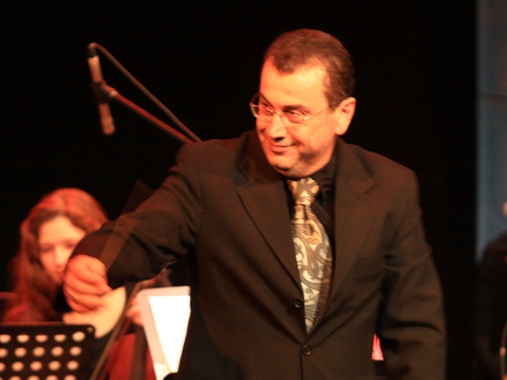
For those who missed hearing “Avinu Malkenu” drift through a Moashah that was preceded by taqasim on qanoun, here’s a short description of an amazing evening:
The first piece on the program was Longa Riad, composed by Riad al-Sunbati and arranged by Prof. Taisser Elias. Riad al-Sunbati (1906 – 1981) was an Egyptian composer who composed music for Um Kalthoum. Dr. Wiesel explained that the Longa is a dance of Ottoman origin that later migrated to Eastern Europe. The “Riad” in the title refers to the name of the composer. Dr. Wiesel said of this work, “The music is fast and lively, and creates a feeling of joy.” The same can be said for the energy, creative freedom and talented performance of the orchestra as a whole.
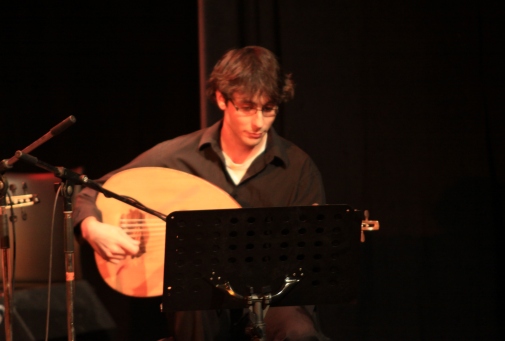
Next was Sama’i Nahawand, composed by Masud Jamil Bey (1902 – 1963), arranged by Wisam Gibran (who formerly conducted the orchestra) and Prof. Taisser Elias. The sama’i is an Arabic musical genre it is similar to the Western rondo in form, with the first part returning in alternation with the different, succeeding parts: abacad etc. Nahawand refers to the maqam, the scale in which it is composed. This work featured the improvisations of two soloists: Louie Khalifa – Oud and Shukri Amsis – Qanoun.
The interwoven layers of time and cultures were felt in the rendition of BaGalil (Hebrew: In the Galilee), with lyrics by Avraham Broides and music by Nahum Nardi, arranged by Prof. Taisser Elias. The song is also known by the name “Alei Givah” (Hebrew: on the hill) and it is assumed that the composer, Nahum Nardi based this composition on an Arab folk song.
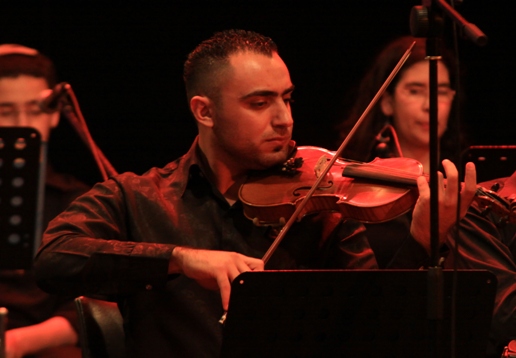
Piras Saleh on Arabic violin and Tair Badr on Oud performed solos on Zichriati (Arabic: memories), composed by Mohammed El Qasabgi (1882 – 1966) and arranged by Prof. Taisser Elias. A prominent Egyptian Oud player and composer, El Qasabgi was a favorite composer for Um Kalthoum.
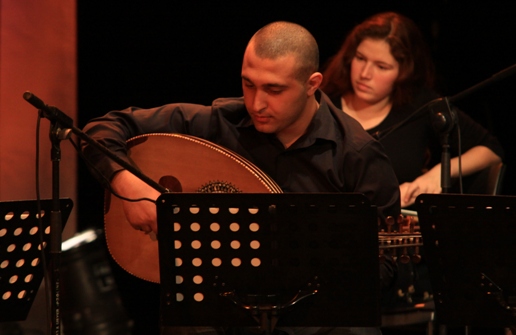
Orchestra members Tair Badr, Piras Saleh, Shukri Amsis, and Ataf Basharat performed a medley of the songs of Mohammed Abd el-Wahaab, an important Egyptian composer and singer.
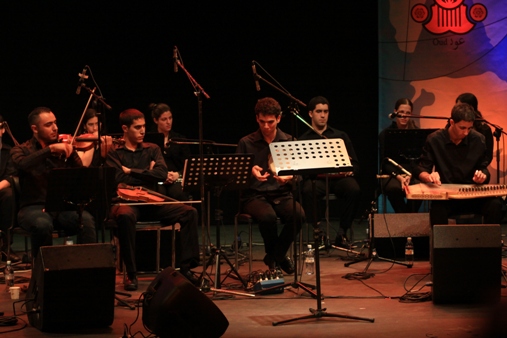
Then the orchestra regrouped to perform Perah HaLimon (Hebrew: the Lemon flower), a well-known song from the repertoire of Moroccan-Andalusian Jo Amar (1930 – 2009), arranged by Avi Amzaleg Eilam (founder of the Andalusian Orchestra). Dr. Wiesel said that “the lemon flower is a symbol of hope” and quoted from the song: “The lemon flower will never fade, among the lemon flowers my lost star will shine.”
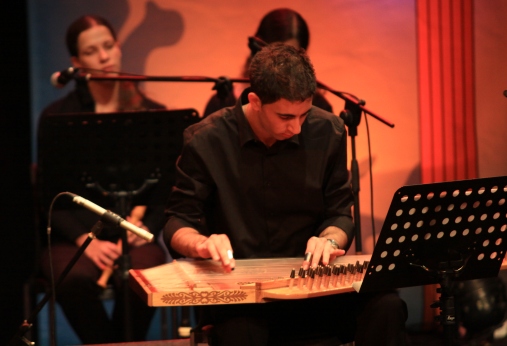
The next song, Moashah Lama Bada by Abd al-Rahim al-Maslub, arranged by Prof. Taisser Elias, opened with taqasim by Shukri Amsis on the qanoun. A traditional element of Middle Eastern music, taqasim are improvisations created according to a complex structure of rules and conventions, requiring knowledge, skill and invention. Dr. Wiesel promised the audience a surprise in the midst of the piece, performed by Hila Zamir on clarinet. On hearing the familiar melody of “Avinu Malkenu” I was surprised and delighted by this moment of extreme fusion, and recollected Dr. Wiesel’s words of introduction to the song: “The Moashah originated in Andalusia and it is sung by Muslims, Christians and Jews. There is a deep multicultural statement in the song and it is symbolic in its expression of the longing for peace, which is this orchestra’s mission.”
The Hebrew folk song Shibolet BaSadeh (Hebrew: grain in the field) composed by Matitiyahu Shalem (1904 – 1975) and arranged by Visam Jubran was the closing piece with ornamentation by Amir Tiroshi on recorder. Shalem was one of those who established the Kibbutz traditions of celebrating the Jewish holidays through song and dance.

Midnight East encourages everyone to become better acquainted with this wonderful orchestra and their unique sound and plans to follow up with updates on future concerts. As a first step, these are the musicians and their instruments:
Renen Mitzner – flute
Amalia Etedgee – flute
Galit Zadok – recorder
Amir Tiroshi – recorder
Hila Lahav – recorder
Piras Saleh – violin
Mor Avigdor – clarinet
Shukri Amsis – qanoun
Louie Khalifa – oud
Michael Ouda – oud
Dan Sela – contrabass
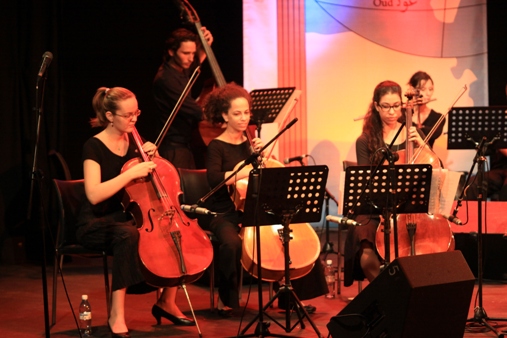
Dara Bloom – cello
Anat Rodstein – cello
Moran Chester – cello
Hila Zamir – clarinet
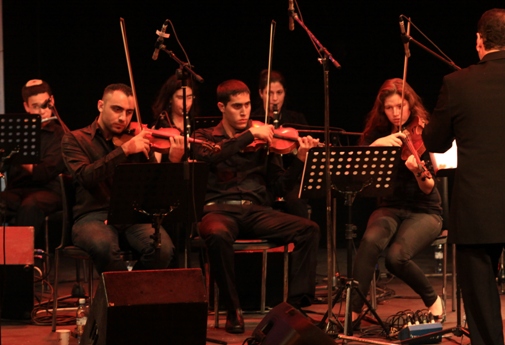
Reut Louie – violin
Tair Badr – oud
Nadim Makhoul – violin
Ataf Basharat – drum
AYELET DEKEL


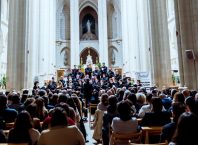



Comments are closed.